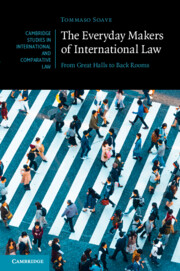Book contents
- The Everyday Makers of International Law
- Cambridge Studies in International and Comparative Law: 170
- The Everyday Makers of International Law
- Copyright page
- Dedication
- Epigraph
- Contents
- Preface
- Abbreviations
- 1 Carnegieplein 2, 10:00 am
- 2 Coffee, Cigarettes, and International Judicial Practices
- 3 A New Generation of Litigators
- 4 Telling a Story
- 5 The Invisible Army
- 6 The Three Wise Monkeys
- 7 The Lyophilization of Life
- 8 The Memo
- 9 To Capture the World
- 10 Bricolage
- 11 The Explorer
- 12 A Four-Letter Word
- 13 What Does It Mean…
- 14 The Stage
- 15 The Moment of (Constructed) Truth
- 16 Truth Woven Together
- 17 Spijkermakersstraat 9, 8:00 pm
- Index
- Cambridge Studies in International and Comparative Law
4 - Telling a Story
Published online by Cambridge University Press: 03 November 2022
- The Everyday Makers of International Law
- Cambridge Studies in International and Comparative Law: 170
- The Everyday Makers of International Law
- Copyright page
- Dedication
- Epigraph
- Contents
- Preface
- Abbreviations
- 1 Carnegieplein 2, 10:00 am
- 2 Coffee, Cigarettes, and International Judicial Practices
- 3 A New Generation of Litigators
- 4 Telling a Story
- 5 The Invisible Army
- 6 The Three Wise Monkeys
- 7 The Lyophilization of Life
- 8 The Memo
- 9 To Capture the World
- 10 Bricolage
- 11 The Explorer
- 12 A Four-Letter Word
- 13 What Does It Mean…
- 14 The Stage
- 15 The Moment of (Constructed) Truth
- 16 Truth Woven Together
- 17 Spijkermakersstraat 9, 8:00 pm
- Index
- Cambridge Studies in International and Comparative Law
Summary
This chapter takes a break from ICJ proceedings and turns to international trade litigation. In Brussels, Commission lawyers Jasper Schoonraad and Duncan Doyle are preparing the European Union’s defence in a WTO dispute about imports of palm oil. The chapter is devoted to the difficult business of making a persuasive case before an international court, and reviews the building blocks of a good written brief. The skilful collection and organization of factual evidence, the ability to formulate legal arguments that resonate with the judges’ sensibilities, and the reputation of counsel in their professional environment are the elusive hallmarks of success as an international litigator. However, what distinguishes an excellent brief is its internal logic. To make a truly strong case, the counsel must develop a tight and coherent narrative that provides the court with the means to comfortably rule in their client’s favour.
Keywords
- Type
- Chapter
- Information
- The Everyday Makers of International LawFrom Great Halls to Back Rooms, pp. 79 - 101Publisher: Cambridge University PressPrint publication year: 2022

